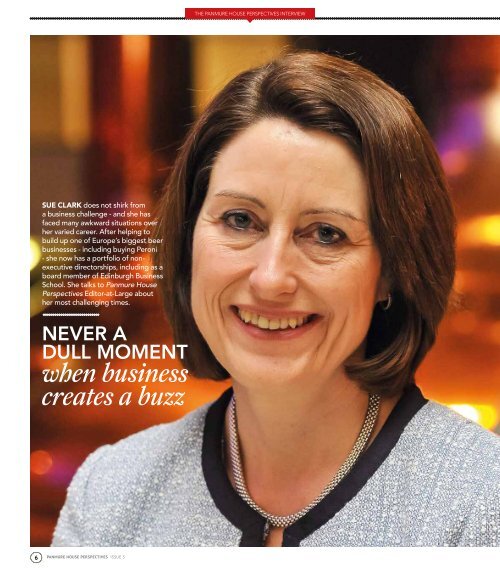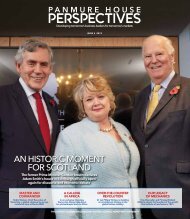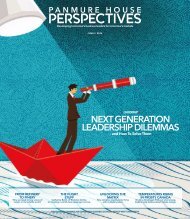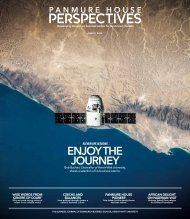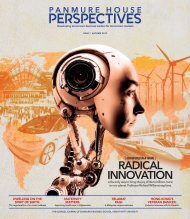Panmure House Perspectives - Issue 5, 2019
Panmure House Perspectives, the new international business journal of Edinburgh Business School, which showcases the best research undertaken by our doctoral students, interviews with major global business figures and viewpoints from leading academics from or own university and beyond.
Panmure House Perspectives, the new international business journal of Edinburgh Business School, which showcases the best research undertaken by our doctoral students, interviews with major global business figures and viewpoints from leading academics from or own university and beyond.
Create successful ePaper yourself
Turn your PDF publications into a flip-book with our unique Google optimized e-Paper software.
THE PANMURE HOUSE PERSPECTIVES INTERVIEW<br />
SUE CLARK does not shirk from<br />
a business challenge - and she has<br />
faced many awkward situations over<br />
her varied career. After helping to<br />
build up one of Europe’s biggest beer<br />
businesses - including buying Peroni<br />
- she now has a portfolio of nonexecutive<br />
directorships, including as a<br />
board member of Edinburgh Business<br />
School. She talks to <strong>Panmure</strong> <strong>House</strong><br />
<strong>Perspectives</strong> Editor-at-Large about<br />
her most challenging times.<br />
NEVER A<br />
DULL MOMENT<br />
when business<br />
creates a buzz<br />
S<br />
ome people relish a challenge.<br />
If you scan Sue Clark’s career<br />
path, you will see she has had<br />
to navigate change, disruption<br />
and growth in business at<br />
an astonishing level. This, in<br />
turn, makes this Heriot-Watt<br />
University MBA graduate and Non-Executive Director<br />
of Edinburgh Business School one of the most soughtafter<br />
and respected female non-executive directors in<br />
the UK.<br />
She has enjoyed the buzz at a series of high-profile<br />
companies, which is probably why she finds solace<br />
in the recreational activity of bee-keeping at her<br />
leafy home in Hertfordshire. Although being a keen<br />
apiarist and gardener may have more to do with a BSc<br />
degree in Biological Sciences, which she completed at<br />
Manchester University.<br />
“If I think about my career, one of the themes – and<br />
I don’t know if this is lucky or unlucky – is that I’ve<br />
always worked in companies that have challenges or<br />
aren’t in the status quo,’’ she says in an interview with<br />
<strong>Panmure</strong> <strong>House</strong> <strong>Perspectives</strong>.<br />
In a quick synopsis: Sue joined ScottishPower in<br />
1992, just after it listed; worked at Railtrack and had<br />
to deal with the aftermath of railway disasters and<br />
investor meltdown; moved to beer-makers SABMiller,<br />
joining as it listed on the London Stock Market; while<br />
one of her first non-executive directorships was with<br />
AkzoNobel, which had fought off a hostile takeover<br />
battle. Today she sits on the board of Imperial<br />
Brands, the global tobacco business moving to next<br />
generation products, and Tulchan Communications,<br />
a financial communications outfit which works with<br />
many of the City’s leading businesses.<br />
Looking back, she recalls her time with the Scottish<br />
utility, which is now part of Spanish-based Iberdrola,<br />
with immense pride. “I was there in the glory days of<br />
Scottish Power,’’ she says, cautioning herself that it<br />
might not be right to state this.<br />
Yet there is no doubt it was a high point for<br />
Scottish business. Ian Robinson, later Sir Ian, was in<br />
the driving seat as Chief Executive with Ian Russell,<br />
the current chairman of the Infrastructure Commission<br />
for Scotland, as the Finance Director. Scottish Power,<br />
emerging from the South of Scotland Electricity Board,<br />
was the first public company to start the consolidation<br />
among UK utilities after privatisation in 1990 and Sue<br />
Clark, who had worked with the Central Electricity<br />
Generation Board, joined as Investor Relations Director<br />
in Glasgow. Until then, there was a group of 12<br />
regional electrical companies across the UK. Scottish<br />
Power bid for ManWeb, buying that business in January<br />
1996, opened the flood gates. The company moved<br />
into multi-utilities, buying Southern Water, created<br />
Scottish Telecom, which was later floated as Thus, and<br />
then bought PacifiCorp in Oregon, the US utility. Sue<br />
Clark made headlines for working to the end of her<br />
pregnancy and her daughter Lucy was born literally<br />
hours after sealing the £4.5 billion deal. By 2000,<br />
ScottishPower had a market capital of around £10<br />
billion and a turnover of £6 billion.<br />
SCOTTISH POWER<br />
IN 2000<br />
£10 BN<br />
MARKET CAPITAL<br />
+<br />
£6 BN<br />
TURNOVER<br />
“The business at the time was at the heart of the FTSE100 and we did a lot of things we<br />
were really proud of. During my time there, we were voted in The Times survey as The Most<br />
Admired Company in the UK. This focused not only on business performance but also on the<br />
work we were doing in the community and on sustainability.”<br />
It was a relentless job that was rewarding for a high-flying woman in her early 30s.<br />
“The Scottish utilities got a much tougher deal than those in England and Wales<br />
and we had to work hard to get the investor community to understand the potential of<br />
ScottishPower. It was a surprise that we stepped forward and led the industry consolidation.<br />
The management team at the time was outstanding.’’<br />
MBA PARTNERSHIPS WITH SCOTTISH FIRMS<br />
Her job was not without its challenges. A major substation explosion resulted in the<br />
death of two workers, then thousands of customers were cut off from their electricity<br />
supply in a black-out during Christmas and New Year. It was Sue Clark’s job to manage the<br />
communications during this fraught period.<br />
Learning was a key part of the organisation with Sir Ian Robinson leading the<br />
Government’s Welfare to Work initiative and establishing ScottishPower’s own learning and<br />
continuous training culture. This development in people led Sue Clark to undertake her MBA<br />
at Heriot-Watt University.<br />
“I came to do my MBA on the back of a ScottishPower programme which was part of<br />
a business-sponsored MBA. A whole cohort of ScottishPower’s management team was<br />
sponsored and went through an MBA programme.’’<br />
Professor Keith Lumsden was running Edinburgh Business School at the time and her<br />
thesis was on the market valuation of utility companies.<br />
“The great thing was the way the MBA was structured, it was done in partnership<br />
with other Scottish companies. Students were working and learning at the same time. It<br />
is a model that worked for me because you can take what you are learning back into the<br />
business and vice versa. You were able to see the academic underpinning of what you were<br />
doing at a corporate level.’’<br />
After the birth of her second daughter, 11 months after her first, Sue Clark moved from<br />
ScottishPower to be nearer her own family in England. She joined Railtrack as a Director of<br />
Corporate Affairs.<br />
The UK’s railway industry, also undergoing privatisation, was in a controversial state<br />
where the railway assets and stations were separate from the train operating companies,<br />
who were bidding for rail passenger franchises. However, there had been massive underinvestment<br />
in the rail infrastructure for generations and Railtrack hit the news for all the<br />
wrong reasons.<br />
“Railtrack was in the public eye. It was a very torrid two years of my life. I arrived after<br />
the Ladbroke Rail Disaster [when 31 were killed and over 400 injured] and then went<br />
straight into the Hatfield crash [four killed and 70 injured] in October 2000. There were<br />
subsequently two or three other crashes.’’<br />
Moreover, Sue Clark also had to deal with the bereaved and the injured from the rail<br />
disasters.<br />
“This was a very personal learning experience within business. I don’t think there are any<br />
right answers but it is very difficult when it comes to corporates showing compassion for<br />
those who have been deeply traumatised.’’<br />
While the short-term grief and pain had to be managed, it is the longer term impact of<br />
survivor groups that was more difficult. “The reality is that you can’t give people what they<br />
really want, which is the return of loved one who has died in a rail crash, or their lives back<br />
to the way they were before. We kept working with people but it became clear we were not<br />
able to give them what they really wanted.’’<br />
As Head of Corporate Affairs, one of the biggest issues was managing the external<br />
perception, angry shareholders, and supporting the much-maligned Gerald Corbett and<br />
then Steve Marshall. After Hatfield, there was fresh investment in the railway which led<br />
to the closure of large sections for upgrade. Railtrack faced the lion’s share of public and<br />
shareholder opprobrium at the disruption and the state of the UK’s railways. Eventually, this<br />
led to Railtrack losing its licence to operate and the creation of state-owned Network Rail.<br />
I wanted to go somewhere that was fun,<br />
global and a lot less contentious.<br />
Beer is a fantastic business because it is so social and it adds to people’s<br />
pleasure, if it is consumed properly.’’<br />
6 PANMURE HOUSE PERSPECTIVES ISSUE 5<br />
ISSUE 5 PANMURE HOUSE PERSPECTIVES<br />
7


